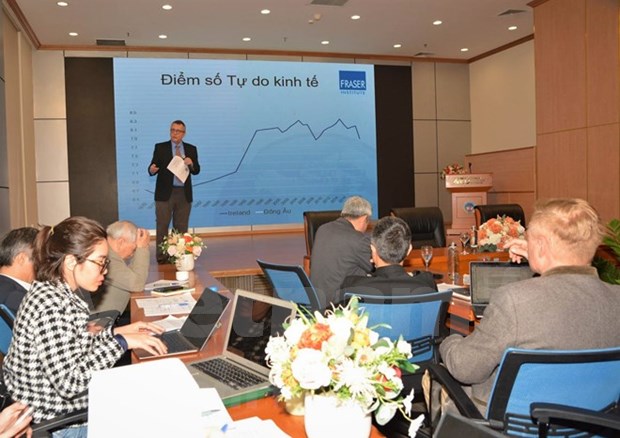Economic institution reform crucial for completion of upper-middle-income goal: experts
As Vietnam is about to join the group of upper-middle-income countries and pursuing the goal of becoming a developed and high-income country by 2045, the continuous renovation of economic institutions becomes more urgent than ever, said experts at a political dialogue workshop in Hanoi on March 1.
 An overview of the event (Photo: VNA)
An overview of the event (Photo: VNA)Prof. Dr. Pham Hong Chuong, President of the National Economics University said that after more than 30 years of renewal, Vietnam has become an economy with extensive integration into the world.
The country has continuously built and adjusted its legal system to match the free trade agreements that it has signed, he noted, adding that a series of laws have been amended towards facilitating people's and enterprises' investment and business activities.
The efforts have brought the country's per capita income from about 200 USD in 2019 to 3,590 USD in 2021 as reported by the World Bank, he noted, stressing that if the country can avoid the low-income "trap," it may become an upper-middle-income country before 2030.
Chuong pointed to a number of shortcomings in the operation of the Vietnamese market economy currently, including problems in intellectual property protection and the overlapping of legal documents.
He underlined that economic institution reform is the key to economic development achievements.
Since 2011, the Government has consistently reformed the market economy institution with priority to macro-economic stability, improvement of investment and business environment, and strengthening of international integration, which has resulted in a healthy economy, he noted.
Foreign currency reserves remain high, while the ratio of public debt to GDP is low, and foreign investment and import-export turnover have been continuously rising through the years, he added.
Dr. Fred McMahon from Fraser Institute of Canada said that Vietnam has posted a high annual growth of 6% in the last 10 years. In order to maintain a high growth even after becoming richer, the country's economy should become more competitive, he said.
Dinh Tuan Minh, Director of the Market-based Solutions Center for Social and Economic Issues (MASSEI) held that Vietnam is becoming closer to the group of upper-middle-income countries in terms of component indexes such as government scale, legal system and ownership, and credit, labour and business management. However, the country has a long way to go in other indexes such as good currency and international trade.
Tuan gave a number of suggestions in economic institution reform based on the global economic facilitation criteria.
He said that it is necessary to review non-tariff barriers towards clearance, transparency and stability, while staying persistent in administrative reform in customs, and continuing to review regulations on capital control in compulsory procedures./.













